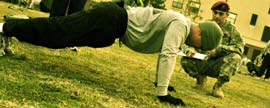AR 621-1 Training of Military Personnel at Civilian Institutions
This regulation:
a. Provides policies for full-time educational programs (fully and partially funded) for AD commissioned, noncommissioned, and warrant officers in civilian schools, commerce, or industry, and applicable service schools that offer accredited degrees. The programs support the following Army goals:
(1) That all commissioned officers obtain a baccalaureate degree. Officers are also encouraged to obtain an advanced degree in a field related to one of their specialties by taking part in off-duty educational programs.
(2) To educate selected officers on a full-time basis to an advanced degree level to meet needs validated by the Army Educational Requirements System.
(3) That all career warrant officers be encouraged to obtain their associate degree in a field related to their specialty by the time they reach their fifth year of warrant officer service. Warrant officers are also encouraged to obtain a baccalaureate degree by the 13th year of warrant officer service in a field related to their functional specialty by taking part in off-duty educational programs.
(4) To educate selected warrant officers on a full-time basis to an advanced degree level (baccalaureate or master’s) to meet needs validated by the AERS.
(5) To educate selected noncommissioned officers on a full-time basis to an advanced degree level (associate, baccalaureate, or master’s) to meet goals as defined by applicable branch proponents.
(6) To educate officers and senior noncommissioned officers who normally have contact with civilian industries in performing official duties.
b. This regulation also governs short course training for Army commissioned officers, warrant officers, and enlisted personnel on active duty.
CLICK TO DOWNLOAD
You might be interested in…
Disclaimer: Though all content posted on AskTOP.net is reviewed by our qualified subject matter experts, you should not make decisions based solely on the information contained in this post. Use information from multiple sources when making important professional decisions. This is not an official government website.













